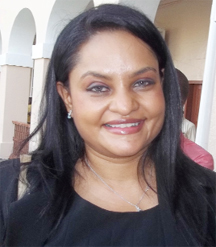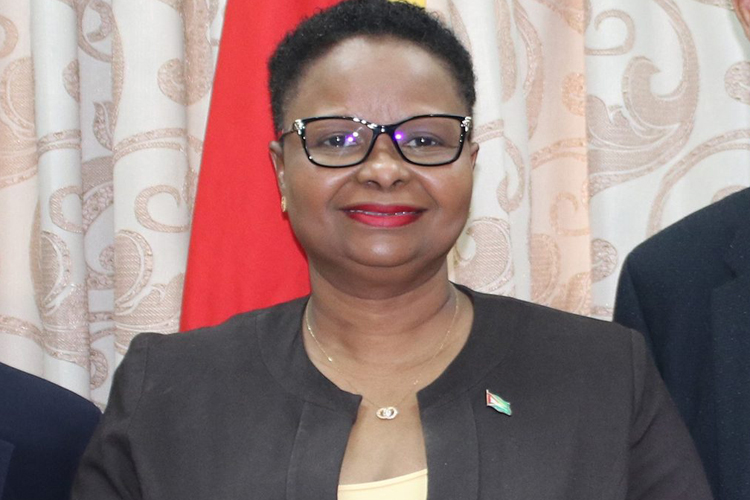Although there have been 119 recorded deaths at the Neonatal Intensive Care Unit (NICU) of the Georgetown Public Hospital Corporation (GPHC) over the past year, and 32 deaths in the first three months of 2018, no special investigations have been warranted, said Minister Volda Lawrence.
Lawrence, who holds the portfolio of Minister of Public Health, related yesterday that during the period of June 1st, 2017, to June 30th, 2018, there were 119 recorded deaths. This number represents 10.3% of the babies hospitalised during this period, as 1,155 babies were admitted to the NICU during those months for care.

“Too high,” said PPP/C Member of Parliament (MP) Dr Vindhya Persaud, in response to the statistics presented.
Lawrence had at the time been responding to oral questions posed by Persaud, who enquired about what she perceived to be an “increase” in neonatal deaths at the institution.
“Yes, exactly, too high. Even one is too high… and if you look over the years, this has been declining and we continue to work and put measures in place to ensure that we can be able to bring this down to zero,” Lawrence replied.
Last night, the GPHC supplemented Lawrence’s information and said the number of deaths had been declining from a recent high of 295 in 2014. It further said that the hospital has the only level three NICU in the country and the sickest babies from all over Guyana are received at the GPHC.
The Minister, in her response, had corrected Persaud, stating that there had been no increase. Rather, she said that the deaths recorded fell in line with more recently recorded statistics.
“Let me say that while we have signed on to the SDGs [Sustainable Development Goals], and we are working towards being compliant of SDG 3, this document recognised that we have the right and also, the onus is on us to ensure that at every level, we provide the necessary services for our people. And as a result of that…we have looked at this particular area over the last three years, we have invested a lot of money into this particular department, and so I would like to say to the Honourable Member that during the period which she has indicated…we did not see an increase; it was the same line in terms of how those deaths which we had occurred took place,” she stated.
Lawrence later related, under questioning, that there had been 10 deaths in January, 10 in February and 12 in March, but noted that June saw a decrease, with only three deaths being recorded.
“I think you will agree with me by now that it was alarming and I was right to be alarmed. The question that was asked previously was when is it alarming enough to have an investigation? 32 deaths from January to [March] to me warrants that…It warrants an investigation from me from the time they’re the first couple deaths in my humble opinion. The question I want to ask now: what were the direct causes of deaths within this period? Were they inspection based?” Persaud, a medical doctor, questioned.
Persaud also questioned whether the Ministry and the GPHC had investigated the causes of the deaths recorded (she had referred to the “increase”), asked who had conducted them and when they had occurred.
She had further questioned what corrective measures were recommended and have been implemented following any such investigation, and whether poor sterility and infrequent testing of the unit were responsible for any of the deaths.
“With regards to the investigative cases of neonatal deaths, let me just inform the Honourable Member in this house that every neonatal [death] is reported and a report is prepared and reviewed by the Child Mortality Committee which comprises of not only persons from within the government sector, but those from the private sector. And if the report shows any discrepancies, then further investigations are done. And since for that period under review, there was no special investigation launched since there was no increase in the neonatal deaths in this period,” Lawrence stated.
Because there was no special investigation, she noted that there were no recommendations to be implemented.
As for poor sterility and infrequent testing, the Minister related that the hospital follows a routine to prevent mortality, which involves cleaning the NICU thoroughly and then conducting sterility checks.
“…And then blood culture results from the NICU are reviewed. Once that is done then there is a review of all cleaning protocols and hygiene compliance audits are done by the quality improvement department. Further to that, the NICU is a clean environment; sterility checks are only warranted after a general cleaning and decontamination is done. Last year, the reconstitution of the Child Morbidity and Mortality Committee was done and this committee is there…to review all child deaths,” she added.
The MP had also asked whether the families were informed that there were “potentially fatal infections” at the NICU before the babies were placed there. Lawrence, after seeking “technical advice,” responded, “With regards to parents, I’m being informed, yes… even when the baby is in difficulty, the parents are notified and they’re allowed to be there with the child during this period.”
When her time for questioning had elapsed, Persaud also requested that the Minister inform what bacteria were identified during the last inspection.
The MP, after enquiring into whether the Ministry’s nursing programme includes components that train the students in techniques necessary in the NICU, was asked by the Minister to put the question in writing so the information could be sought. Lawrence also emphasised that the Ministry and GPHC are prepared to answer any questions posed.
The GPHC release issued last night follows:
(Yesterday)… during the 90th sitting of the 11th Parliament, Opposition Member of Parliament Dr. Vindhya Persaud posed a question relating to the Neonatal Mortality Rate at the Georgetown Public Hospital Corporation (GPHC).
The GPHC wishes to assure the public that every life in the Neonatal Intensive Care Unit (NICU) is precious to its staff and every death is distressing. GPHC continues to work closely with the Ministry of Public Health, the Pan American Health Organization and other agencies in an effort to further decrease neonatal mortality in Guyana. Significant gains have been made in recent years as the details below confirm.
In addition to the comprehensive and detailed response provided in the National Assembly by Minister of Public Health, the Hon. Volda Lawrence to Dr. Persaud’s question, the GPHC wishes to share with the media and the public the following important facts in understanding infant mortality rates in general and specifically at the GPHC.
- GPHC is home to the ONLY Level 3 NICU in Guyana.
- This means that GPHC is the only public hospital that is capable of providing a neonate with invasive breathing support.
- Therefore GPHC receives the sickest and most high risk neonates from BOTH the public and PRIVATE medical institutions, countrywide.
- GPHC has capacity to simultaneously support 18 babies in our NICU.
- However, because sick babies arrive every day, the admission numbers trend over this frequently.
- GPHC provides care to all babies and does NOT turn away any sick baby that arrives.
For the period June, 2017 to June, 2018, there were 6409 live births and 119 neonatal deaths at GPHC. This is a significantly lower number from the decade-high 295 deaths in 2014. See table below with annual statistics from 2010 to 2017. Since 2014 annual deaths have been declining.
As is clearly shown in the table above, the total number of deaths in the Neonatal Intensive Care Unit has decreased significantly by an enormous 55.1% from 2015 to 2016 and continues to decrease.
Again the GPHC reiterates that the life of every baby and every patient in its care is important and will continue to do everything possible to ensure that it improves the delivery of health care services which it provides.


